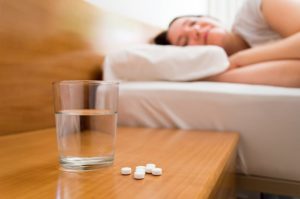When you buy through our links, we may earn a commission. Products or services may be offered by an affiliated entity. Learn more.
How to Use Sleep Medications Safely
- What Should You Take Into Consideration Before Taking a Sleep Medication?
- What Precautions Are Important When Taking Sleep Medications for the First Time?
- Is It Safe To Take Sleeping Pills Every Night?
- Are Sleeping Pills Safe?
- Who Should Be Extra Careful When Taking Sleep Aids?
- What Is the Safest Sleep Aid?
- Sleep medications are usually prescribed in addition to other lifestyle changes intended to improve sleep.
- Different sleep aids may help you fall asleep faster or sleep for longer.
- Prescription sleep medications can be addictive and often come with side effects.
- Always consult a healthcare provider and follow the recommended dosage and timing for sleep medications.
Sleep medications are one of the most common treatments for insomnia. Used properly, they can be a helpful way of drifting off on nights when sleep is difficult.
Unfortunately, studies have found that many people develop unsafe habits regarding sleep aids. By working with a doctor and understanding the risks associated with sleep medications, you can minimize your chances of unwanted side effects.
What Should You Take Into Consideration Before Taking a Sleep Medication?
Sleep medications are only one part of an overall treatment plan for insomnia. Because they can be addictive and they often come with side effects, the American College of Physicians and the American Academy of Sleep Medicine recommend using other techniques before turning to pharmaceutical sleep aids.
Cognitive behavioral therapy for insomnia (CBT-I) is the preferred first line of treatment. Your health provider can help you work through stress, anxiety, or other emotions that may be affecting your sleep. They can also teach you sleep hygiene habits that can lead to long-lasting benefits for sleep. That said, for some people, a short-term course of pharmaceutical sleep aids may help in developing these healthy behaviors and learning to manage insomnia.
Many sleep problems are actually due to an undiagnosed sleep disorder or medical condition. Conducting a sleep study or other tests can shed light on these problems, which may need to be treated along with the insomnia itself.
What Precautions Are Important When Taking Sleep Medications for the First Time?
You should always talk to your doctor before starting a new kind of medication. Even over-the-counter sleep aids and herbal supplements carry potential risks. A thorough discussion with a healthcare professional can help you decide if the benefits outweigh the risks.
Choosing a Sleep Aid
There are many types of sleep aids. Before prescribing a specific sleeping pill, your doctor will take note of existing mental or physical health concerns and ensure that the sleep aid will not interact with any medications, recreational drugs, or herbal remedies you are currently taking. You should also confirm that you are not allergic to any ingredients in the sleep aid.
Different sleep aids may help you fall asleep faster, reduce nighttime awakenings, or sleep for longer. Your doctor will choose a short-acting or long-acting sleep aid based on what is more appropriate for your situation. Experts recommend taking the lowest dose possible to reduce potential side effects. If you have a sleep disorder that can be treated with a specific type of sleep aid, your doctor will also take this into account.
How to Safely Start Treatment
Once your doctor chooses a sleep aid, you should read the pamphlet carefully, follow your doctor’s instructions on dosage and timing, and ask any relevant questions. Avoid starting treatment right before an important event, in case the medication causes unexpected side effects.
Most sleep aids are designed to be effective during four or eight hours. Taking a pill when you need to wake up before this time may cause next-day grogginess. For people who have trouble falling asleep but sleep soundly once they are asleep, it may be more appropriate to use a shorter-acting sleep aid.
Experts advise against taking sleeping pills before driving or doing other activities that require your full attention. This also applies to cases where you might need to wake up during the night, such as if you are caring for a dependent person. Sleep aids should be taken right before bedtime, as taking them too early in the evening may interfere with evening activities. Keep in mind that some sleeping pills will take longer to kick in if taken with food.
What To Do if You Have Problems With Your Sleeping Pills
It may take a few nights before you start to see improvements to your sleep, so don’t change your dose without first talking to your doctor. Some sleep medications can cause rebound insomnia if they are stopped too suddenly. If you notice side effects or if you have any other concerns, talk to your doctor as soon as possible so they can help you safely stop the medication.
If your doctor has prescribed sleeping pills long-term, you will most likely go back after several weeks for a follow-up visit. If you and your doctor decide the medication is not working for you, they may change your dosage instructions or assign you a different one.
Is It Safe To Take Sleeping Pills Every Night?
Most experts agree that sleep aids should not be used long-term. Sleeping pills are best used for short-term stressors, jet lag, or similar sleep problems. There is limited evidence on the safety and efficacy of using sleep aids for more than four weeks, but some studies have found that daily use of sleep aids may be linked to a higher risk of mortality. Sleep aids may also affect sleep stages, with corresponding effects on sleep quality.
Many people develop a tolerance to sleep aids, meaning they need higher doses of the drug over time to get the same effects. This may be accompanied by addiction or withdrawal symptoms, including rebound insomnia, anxiety, irritability, or strange dreams.
For people with insomnia that resists other forms of treatment, doctors may give you prescription sleeping medication to be taken regularly. To lower the risk of developing tolerance or addiction, doctors may prescribe these long-term sleep aids for only a few nights a week. OTC sleep aids are not intended for long-term use.
Are Sleeping Pills Safe?
Many people use sleeping pills with no major problems. However, virtually all sleep aids currently on the market do come with potential side effects, such as next-day grogginess, nausea, and headaches. Taking the lowest dose possible may help limit these side effects. Physicians also suggest people avoid taking sleep aids on nights before they may need to make big decisions.
More rarely, you may experience more serious effects. Contact your doctor immediately if you notice any of the following:
- Rebound Insomnia: It’s common to experience a short bout of insomnia after you stop taking sleep aids, even if you only used them for a short time. Where possible, most doctors recommend weaning yourself off the medication by gradually lowering your doses.
- Complex Sleep Behaviors: In rare cases, sleep medications may cause people to carry out activities while not fully conscious, such as driving. These events may happen the first time you take the sleep aid, or after you’ve been taking it for a while. Complex sleep behaviors can be very dangerous and may lead to death or serious injuries. Contact your doctor immediately if you experience a complex sleep behavior.
- Interactions with Other Medications: Extreme care should be taken when mixing sleeping pills with alcohol, opiates, antidepressants, or antihistamines. In particular, combining two or more drugs that depress the central nervous system can lead to slowed breathing and even death. The FDA advises doctors to only prescribe these combinations where there is no other alternative.
Overdosing on certain sleep aids can lead to delirium, impaired breathing and circulation, and death.
Who Should Be Extra Careful When Taking Sleep Aids?
Sleep aids may have additional risks for those with other medical or mental disorders, people who are taking other medications at the same time, and people with health conditions such as kidney disease, liver problems, low blood pressure, breathing difficulties, arrhythmia, or seizures.
Women and older adults tend to metabolize medicine slower, so they usually require lower doses. As there is limited research on the effects of sleep aids while pregnant or breastfeeding, it is generally recommended for pregnant women to avoid taking these medications. Some evidence suggests they may carry risk of harm to a developing fetus.
Older adults are more vulnerable to side effects and injuries from falls, so care should be taken to prevent alertness and balance problems when taking sleep medications. Some sleep aids may also contribute to dementia.
Very few studies have been conducted on the use of sleep medication for children, and most experts advise against using sleep aids in this age group.
What Is the Safest Sleep Aid?
Among the different families of sleep medications, newer medications are generally considered safer than older ones. However, the safest sleep aid for each individual will depend on their age, health, and other personal factors:
- Benzodiazepines: Though still widely used, benzodiazepines are considered among the more addictive sleep aids. They are not usually prescribed long-term, because most people quickly develop a tolerance to their effects.
- Non-Benzodiazepine “Z Drugs”: Newer Z drugs perform similarly to benzodiazepines, but they have a more favorable side effect profile and less risk of abuse. That said, the FDA recently released a warning after discovering that Z drugs are more likely to cause complex sleep behaviors.
- Orexin Receptor Antagonists: It appears that the risk for dependence with orexin receptor antagonists is lower than with other drugs. So far, the primary side effect of this newer sleep aid is somnolence.
- Antidepressants: Antidepressants used for sleep may cause headaches and daytime sleepiness. However, the antidepressants most commonly used for insomnia are usually prescribed at lower doses that are less likely to cause side effects. While some people with insomnia do also suffer from bipolar disorder, antidepressants may make insomnia worse.
- Barbiturates: Formerly very popular, barbiturates have now proved to be habit-forming with a high risk of overdose. The FDA recommends against using these except in very specific cases.
- Over-the-Counter Sleep Aids: The active ingredient in over-the-counter sleeping pills is usually an antihistamine. Most people quickly develop a tolerance to antihistamines, and research suggests that antihistamines may lead to poor sleep quality and next-day sleepiness.
- Melatonin: Melatonin is considered one of the safest over-the-counter sleep aids, with few side effects. A prescription drug called ramelteon is designed to mimic the effects of melatonin. Like melatonin, it is not considered habit-forming and it does not affect balance.
Many people assume OTC sleep aids are the safest sleep medications because they are available without a prescription. However, OTC sleep aids may still have serious side effects. Moreover, medications and herbal supplements that are not approved for insomnia by the FDA may carry additional risks. It is strongly advised to consult a doctor before using OTC medications or natural sleep aids.
Medical Disclaimer: The content on this page should not be taken as medical advice or used as a recommendation for any specific treatment or medication. Always consult your doctor before taking a new medication or changing your current treatment.

Still have questions? Ask our community!
Join our Sleep Care Community — a trusted hub of sleep health professionals, product specialists, and people just like you. Whether you need expert sleep advice for your insomnia or you’re searching for the perfect mattress, we’ve got you covered. Get personalized guidance from the experts who know sleep best.
References
13 Sources
-
Sateia, M. J., Buysse, D. J., Krystal, A. D., Neubauer, D. N., & Heald, J. L. (2017). Clinical Practice Guideline for the Pharmacologic Treatment of Chronic Insomnia in Adults: An American Academy of Sleep Medicine Clinical Practice Guideline. Journal of clinical sleep medicine : JCSM : official publication of the American Academy of Sleep Medicine, 13(2), 307–349.
https://pubmed.ncbi.nlm.nih.gov/27998379/ -
Moore, T. J., & Mattison, D. R. (2018). Assessment of Patterns of Potentially Unsafe Use of Zolpidem. JAMA internal medicine, 178(9), 1275–1277.
https://pubmed.ncbi.nlm.nih.gov/30014137/ -
Qaseem, A., Kansagara, D., Forciea, M. A., Cooke, M., Denberg, T. D., & Clinical Guidelines Committee of the American College of Physicians (2016). Management of Chronic Insomnia Disorder in Adults: A Clinical Practice Guideline From the American College of Physicians. Annals of internal medicine, 165(2), 125–133.
http://annals.org/article.aspx?doi=10.7326/M15-2175 -
Okajima, I., Nakamura, M., Nishida, S., Usui, A., Hayashida, K., Kanno, M., Nakajima, S., & Inoue, Y. (2013). Cognitive behavioural therapy with behavioural analysis for pharmacological treatment-resistant chronic insomnia. Psychiatry research, 210(2), 515–521.
https://linkinghub.elsevier.com/retrieve/pii/S0165178113003442 -
Sivertsen, B., Madsen, I. E., Salo, P., Tell, G. S., & Øverland, S. (2015). Use of Sleep Medications and Mortality: The Hordaland Health Study. Drugs – real world outcomes, 2(2), 123–128.
https://pubmed.ncbi.nlm.nih.gov/27747767/ -
Pagel, J. F., & Parnes, B. L. (2001). Medications for the treatment of sleep disorders: an overview. Primary Care Companion to the Journal of Clinical Psychiatry, 3(3), 118–125.
https://pubmed.ncbi.nlm.nih.gov/15014609/ -
Schwab, R.J. (2020, June). Merck Manual Consumer Version: Insomnia and Excessive Daytime Sleepiness (EDS)., Retrieved December 6, 2020, from
https://www.merckmanuals.com/home/brain,-spinal-cord,-and-nerve-disorders/sleep-disorders/insomnia-and-excessive-daytime-sleepiness-eds -
Hansen, R. N., Boudreau, D. M., Ebel, B. E., Grossman, D. C., & Sullivan, S. D. (2015). Sedative Hypnotic Medication Use and the Risk of Motor Vehicle Crash. American journal of public health, 105(8), e64–e69.
https://pubmed.ncbi.nlm.nih.gov/26066943/ -
Donnelly, K., Bracchi, R., Hewitt, J., Routledge, P. A., & Carter, B. (2017). Benzodiazepines, Z-drugs and the risk of hip fracture: A systematic review and meta-analysis. PloS one, 12(4), e0174730.
https://pubmed.ncbi.nlm.nih.gov/28448593/ -
Schroeck, J. L., Ford, J., Conway, E. L., Kurtzhalts, K. E., Gee, M. E., Vollmer, K. A., & Mergenhagen, K. A. (2016). Review of Safety and Efficacy of Sleep Medicines in Older Adults. Clinical therapeutics, 38(11), 2340–2372.
https://linkinghub.elsevier.com/retrieve/pii/S0149291816307330 -
Lie, J. D., Tu, K. N., Shen, D. D., & Wong, B. M. (2015). Pharmacological treatment of insomnia. P & T: A Peer-Reviewed Journal for Formulary Management, 40(11), 759–771.
https://pubmed.ncbi.nlm.nih.gov/26609210/ -
Center for Drug Evaluation and Research. (2019, May 14). FDA adds Boxed Warning for risk of serious injuries caused by sleepwalking with certain prescription insomnia medicines. U.S. Food and Drug Administration., Retrieved December 6, 2020, from
https://www.fda.gov/drugs/drug-safety-and-availability/fda-adds-boxed-warning-risk-serious-injuries-caused-sleepwalking-certain-prescription-insomnia -
Center for Drug Evaluation and Research. (2019, April 30). Sleep Disorder (Sedative-Hypnotic) Drug Information. U.S. Food and Drug Administration., Retrieved December 6, 2020, from
https://www.fda.gov/drugs/postmarket-drug-safety-information-patients-and-providers/sleep-disorder-sedative-hypnotic-drug-information

























